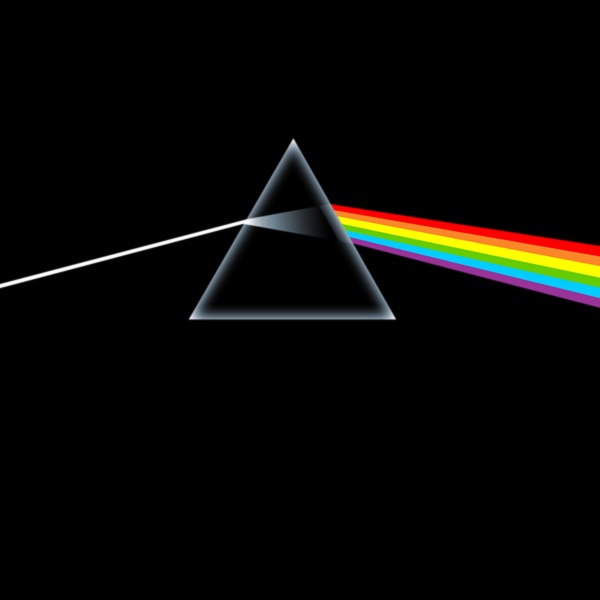

 Pink
Floyd
Pink
Floyd | Release date | Label | Producer | Genre | Length | More info |
| 1973.03.24 | Harvest | Pink Floyd | Classic Art Rock | 42:53 |  
 |
If it's all dark... any colour you like will make no difference.
Background
For many people, Pink Floyd as a meaningful combination of two words did not even properly exist before 1973, although by that time the band had already gone through at least three stages of evolution - the early Syd Barrett-led years of psychedelic glory (1966-68), the brief and, some would argue, not-too-essential period of avantgarde experimentation (1968-70), and the era of Meddle, when they'd already invented their trademark mournful/introspective/epic style but were not yet ready to use it as a weapon of world domination. Experienced music lovers knew very well about all these stages, of course, and although opinions on Floyd's talents as daring-dashing avantgardists continue to be seriously divided, most knowledgeable people today value albums like The Piper At The Gates Of Dawn (1967) and Meddle (1971) as much as "classic era Floyd", if not more so. But there is a very strong case to be made for the argument that all the first seven years of the band's musical journey were mostly spent in an effort to find the best application for their talents, and that it was not until 1973 that they truly found it.
Additionally, 1973 may have been the perfect year for an album that would combine the latest breakthroughs in recording technology with a simple, accessible and meaningful philosophical angle: progressive rock was still very much en vogue at the time, with bands like Jethro Tull and ELP reaching the peaks of their commercial success, but the music was too dense and complex, and the lyrical messages too modernistic to be understood and appreciated by just about anybody. Looking back at the entire field of amazing musical development from 1966 to 1973, it is fairly hard to find even one example of an album that would be musically daring, innovative, ambitious, and pretend to the status of a Very Serious Statement, yet would not prompt a large part of the audience to go "what the hell is this all about, really?" Think of Close To The Edge by Yes, Foxtrot by Genesis, or Larks' Tongues In Aspic by King Crimson - all of them are timeless classics, but all of them also require of you the ability to "tune in" at a frequency that you have to build on your own. Meanwhile, some - if not most - people must have been waiting for somebody to tune them in at their own innate, God-given frequency, and this is where Pink Floyd come in.
Some basic facts
It is important to remember that the album had a fairly long gestation period: an early conceptual version was assembled and premiered for the press as early as February 17, 1972, several months prior to the beginning of the actual recording sessions, and then underwent a long, meticulously thought out series of changes. Tensions between different members of the band were already present, but at the time they worked in favor of the music rather than against the band: according to many sources, Waters largely took care of the "experimental" and "philosophical" angles of the album, while Gilmour and Wright worried more about the actual melodic content and musicality (especially when it came down to emphasizing these different sides in the final mix) - although Waters is always happy to deny this, and it is true that he wrote much of the music on his own.
In any case, the results were worth it: today, The Dark Side Of The Moon is the third best-selling album of all time, and chances are that, if people are still going to pay for music in the future, it might eventually beat at least AC/DC's Back In Black, if not Michael Jackson's Thriller, by mere fact of offering the people a slightly less cheap set of thrills for their money than The Amazing Young Brothers or The Moonwalker. This also sets a predicament: no matter whether you like the record, hate the record, or remain completely indifferent towards it, nothing you say is really going to matter - its immense status in the collective conscience is immune to individual judgements. On the bright side, though, millions of people love DSOTM, and if at least ten percent of that number also love to read about DSOTM, go ahead and write about DSOTM, and someone is bound to eventually read it.
Most probably, you have already heard the album (if you haven't, you'd rather do it right now before proceeding to the review), but it also makes sense to mention that a new re-re-remastered anniversary version of it appears on the CD/SACD/DVD/Blue-ray/whatever market roughly every 10 years (true fans call this "The Decennial Annuity For The Dark Side"), and that the latest largest version is the so-called Immersion box set from 2011, which also contains a complete live performance DSOTM at the Wembley stadium in 1974; an early mix of the album from 1972, with some major interesting differences from the final version; a set of demos, outtakes, and live tracks from around the same time; and three additional DVDs with various 5.1 surround mixes of the album and numerous other ways to help you experience it in new miraculous ways allowed by 21st century technologies and relive the excitement all over again.
For the
defense
But the trick is simple enough. Like the Beatles before them, Waters, Gilmour, Wright, and Mason realize here, much more firmly than their contemporaries, that in order to unify, a great song or album, like one of those "family entertainment" animated movies, has to have something for everyone. Take a fairly straightforward example - ʽMoneyʼ, for instance. What is ʽMoneyʼ? It is a sonic experiment, beginning with rhythmically organized cash registers and then continuing in its odd 7/4 time signature, which is just enough to throw you off the regular balance as you sit there prepared for a predictably conventional blues-rocker. It is, however, also a blues-rocker, which will make you tap your toes despite the rhythmic oddities, play air bass and air guitar, and experience the usual fits of rock ecstasy every time Gilmour's high pitch shoots out into the atmosphere. And then, of course, it is also a simplistically, but cleverly phrased social statement that is as eternally relevant today as it used to be in Shakespeare's times (with each lyrical line self-conscious enough to apologize when it's getting too cliched - "money, so they say, is the root of all evil today...").
And most importantly, in classic Trinity fashion, all three of these are really the same, or at least they fit together seamlessly. Showing off with that sampled introduction? But it is transparent symbolism here, cool-sounding but simple enough for a toddler to understand. Engaging in "rock god mode" guitar solos? But they are a logical continuation of the angry vocals, an expression of hot, frustrated, if helpless anger at the pervasiveness of commercialism. Even that time signature, so naturally evolving out of the cash register clinking and so inescapable, seems to belong: the first two beats, in your mind, still represent the opening of the register, and the next five is the hand of fate counting out the cash. As they change it to regular 4/4 for the Gilmour solo, it's as if the noble guitarist were playing a St. George, trying to stick a hole in the nasty dragon of consumerism - but guess who ultimately wins out at 5:05 into the song. Yes, it all makes sense somehow, in individual aspects and as a collective whole at the same time. How could this not sell millions?
Or take ʽTimeʼ, an equally stellar example of the "integrated package". You have all these clocks - explicitly ringing at the beginning in a confused-chaotic fashion, then fading out as a single Clock of Doom overrides all the individual tiny clocks. The bluesy verses and the gospel chorus are linked to that by means of all the time-related lyrics. The guitar solo is not just there because there should be a guitar solo - like the one in ʽMoneyʼ, it also depicts frustration and desperation, a sudden and violent fit that comes on the moment you realize that "you missed the starting gun". The reprisal of ʽBreatheʼ at the end is not just there because reprises are cool - it is organically linked to the "hanging on in quiet desperation is the English way", as you eventually come to terms with Fate and settle in "beside the fire". Experimentation, multi-sectionism, guitar god mode, blues, gospel, there-and-back-again cycling - ʽTimeʼ is a journey where every inch and every second make perfect and absolute sense, which - let us be frank about it - is not easily said about any random Yes, ELP, or King Crimson record.
And it could suck - it could all suck - if only the experiments weren't so sonically cool, if only the guitar playing weren't squeezing so much bluesy passion out of every note, if only the lyrics were not able to properly tame and dominate all the tropes and cliches, if only the chord sequences and time signatures did not have those little bits of "unusualness" to them every once in a while. I mean, when you really get down to the bottom of it, the message (or messages) of DSOTM are not that much more sophisticated than the message of something like ʽDust In The Windʼ. Madness, aging, death, consumerism, mutual antagonism... it's not as if these guys could tell us stuff we didn't know already, from centuries of artists, writers, philosophers who could chew Roger Waters up and spit Dave Gilmour out in a second, if they only had access to verbal contents and descriptions of these songs. But, like I said, this is essentially a case of flawless integration. Even the music itself, which is obviously the backbone of the record, does not work nearly as well when it is still free from Waters' words and Parsons' mixing - now that you have all these demos on the Immersion boxset and elsewhere, you can check it out for yourself.
It is interesting, by the way, that for all of the album's greatness, it only has three complete, autonomous "songs" per se - ʽTimeʼ, ʽMoneyʼ, and Rick Wright's lovably pensive ʽUs And Themʼ, which serves its humble function of apologizing for all of humanity right after the irate philippics of ʽMoneyʼ. The other pieces work rather as intros, outros, or conceptual sonic paintings, be it the paranoid schizophrenic pulse of ʽOn The Runʼ, or the glorious death anthem ʽThe Great Gig In The Skyʼ, or the instrumental jam ʽAny Colour You Likeʼ, which is kind of like an implied cynical retort to the gentle tones of ʽUs And Themʼ (actually, in live shows it was more of an excuse to allow the band at least a few minutes of relatively free-form improvisation). Of course, one could suggest that the commercial success of the LP is in some part due to the success of ʽMoneyʼ as a single - yet it is interesting to note that in the US, that single only charted at No. 13, and in the UK it was not released as a single at all, whereas the LP shot up the charts right away; this means that the general public very clearly perceived the cohesiveness of the whole package.
And it is really cohesive, not fictitiously so: ʽThe Great Gig In The Skyʼ is a perfectly natural follow-up to ʽTimeʼ - you may be frustrated and angry at yourself for missing out on all of life's opportunities, but what a better way to have your consolation than to receive the greatest advertisement for the afterlife ever thought of by a rock band publicity agency? Hear Clare Torry in all her glory as she engages in a wild, delirious act of metaphorical sexual intercourse with God, which is what you can have, too, if you just play your cards right. And ʽTimeʼ itself was, of course, a perfectly natural follow-up to ʽOn The Runʼ - because no matter how fast you run and how much breath you waste on your running, you will still be finding yourself in the exact same place at the end of each synthesizer loop, and only a metaphorical nuclear explosion will make you stop in your tracks and understand the futility of it all (yes, no matter how fast you run, you're still going to miss that starting gun). And how beautifully the anger of ʽMoneyʼ and the pacification of ʽUs And Themʼ complement each other... and how well they distribute the singing roles over to Gilmour (the pissed-off personality), Wright (the quiet, moody gentleman), and Waters (the philosophical guru who comes on at the end to draw the curtains)...
...anyway, some of the more obvious virtues of this album (production values, for instance) should probably remain undescribed here, since they have already been mulled over thousands of times. Enough ass kissing, let's get down to the nitty gritty, shall we?
For the prosecution
Arguably the best melody on the entire album belongs to Wright - listening to the bare piano demo on the third disc of the Immersion box set reveals a flash of musical curiosity, with chord changes that come at least from the Paul McCartney school of composing, and then all the way back to various popular and classical masters. But this is rather an exception than the rule, and the rule is... well, in a nutshell, I'd rather enjoy the raw demos of the Beatles than the raw demos of Floyd. For another example, the same boxset also includes an early mix of ʽGreat Gig In The Skyʼ without Clare Torry (instead, there's some silly radio broadcast overdub that does not work at all), and this is where you realize that the melody is sort of ripped off from McCartney's ʽGolden Slumbersʼ. Bring in the woman, quick, before we start losing the point. For another example, isn't ʽBrain Damageʼ sort of a rip-off of ʽDear Prudenceʼ? Yes, it's got a completely different atmosphere and all, but the starting point isn't really a gigantic feat of originality, if you know what I mean.
Naturally, this is not something over which any fan of DSOTM should be genuinely worried. Music-making is a complex and multi-layered affair, and it is just as easy to butcher a great starting melody with bad production, cheap atmospherics, and awful singing as it is to embellish a less-than-perfect starting chord sequence with subsequent layers of sonic perfection. In fact, it is not even a concern that should, at the outset, worry anybody except, perhaps, professional musicologists. But it should probably be a concern for all those endless "greatest songs ever written" competitions, and it definitely should be a concern for all those people who carried on the tradition of valuing tones, overtones, and technology over actual composing. Because even if the melodies of Waters and Gilmour are not among the finest melodies ever written, they still always show a fine understanding of the basic values of blues and pop music. They may be stolen, or borrowed, or quoted, or present little variations on already existing themes, but they are a solid enough foundation on which the band then expands its overwhelming sonic attack.
Other than that general complaint (of a rather theoretical nature, and it still does not prevent me from giving a high overall rating to the album's melodic content), there are very few things that bug meabout DSOTM. I have never been a serious fan of ʽAny Colour You Likeʼ (at least, not until the screeching organ solo kicks in around 1:20), and ʽOn The Runʼ is a curious experience that I have little desire to experience again once it's over, but they are as much an integral part of the album as everything else, and nitpicking about individual tunes here is as silly as complaining about an occasional chip in the stonework of a Gothic cathedral.
Conclusion
Most importantly, this is a record that absolutely refuses to grow old. Probably most electronic wizards today would laugh at the antiquated sounds of ʽOn The Runʼ (even while acknowledging its influence on subsequent generations of electronic composers), but other than that, in 2016 it sounds every bit as modern as more than 40 years ago - precisely because all those sound effects and production tricks were such an integral, relevant part of the conceptual whole from the very beginning, rather than just the product of a "oh, look what the cat dragged in!" anything-goes mindset that caused so many bummers in the history of music technology. This, folks, is simply a textbook example of how to do it right, from head to toe and from substance to packaging (yes, we have not even mentioned the awesome Hipgnosis cover art); even if you are not a major fan, it still makes sense to put this on from time to time, just to remind yourself that "perfection" is not a word to be thrown around lightly.
| Melody |
Voice | Mood | Production | Innovation/Influence | Where it belongs | RYM preference | |
 |
 |
 |
 |
 |
 |
#2 (Jan 10, 2016) |

| Previous entry | Main page | Next entry |